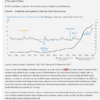The best time to buy as a first home buyer is when you have a very healthy deposit, a good stable job and able to obtain a loan where you can make repayments comfortably ( also being able pay extra in the loan or savings in case you hit hard times).As a future first home buyer (eventually) would this be good for me or bad? Wouldnt this just mean banks tighten up and its harder to get a loan?
It's hard to 'time' the market, many economists have been trying to predict the market every year and are often wrong. If they have trouble determining the market, then the average Joe citizen is unlikely to be better at predicting it.






